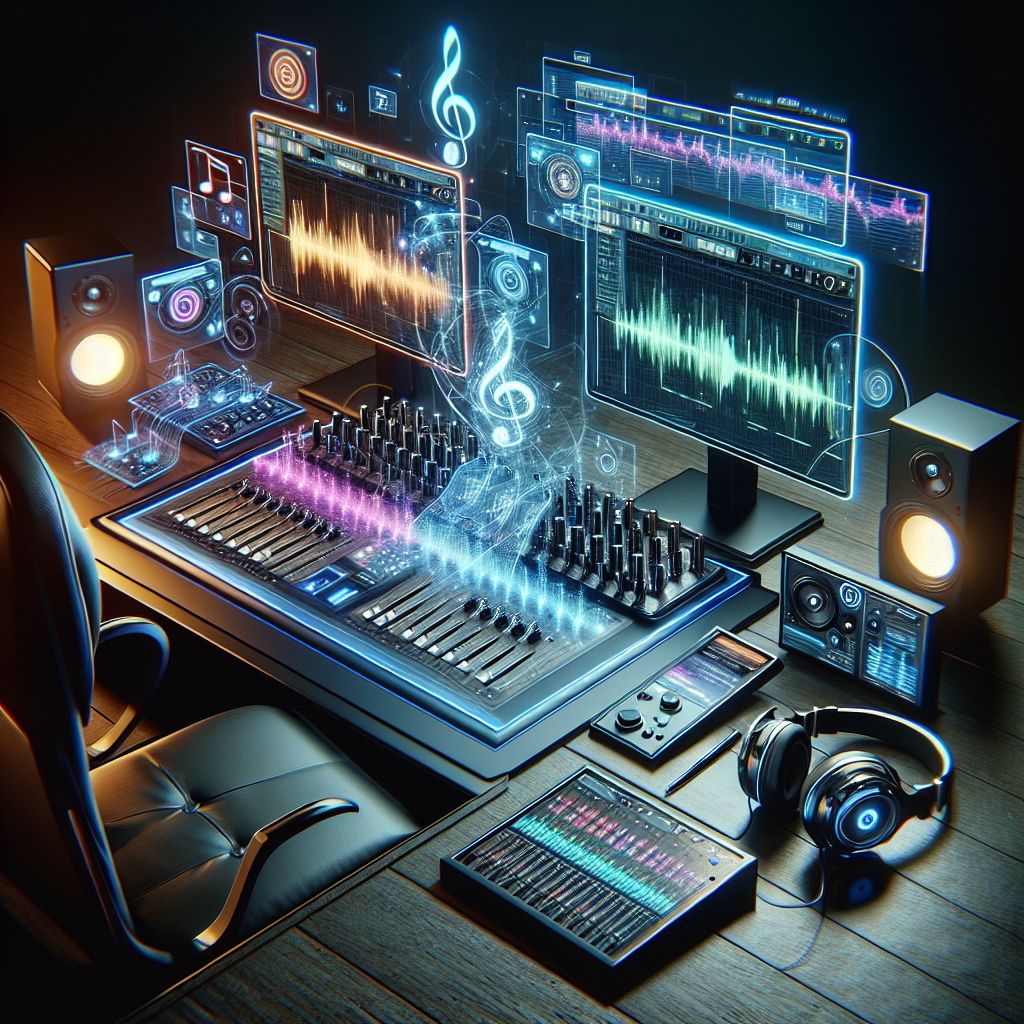Artificial Intelligence (AI) has been making significant strides in various industries, and the music production field is no exception. AI-enhanced music production tools are revolutionizing the way music is created, offering new possibilities and capabilities for musicians and producers. These tools are helping to streamline the creative process, enhance the quality of music productions, and even enable musicians to explore new creative avenues that were previously inaccessible. In this article, we will explore the future of AI-enhanced music production tools and how they are shaping the landscape of music production.
One of the key advantages of AI-enhanced music production tools is their ability to automate time-consuming and repetitive tasks, allowing musicians and producers to focus more on the creative aspects of music production. For example, AI algorithms can assist in tasks such as audio mixing, mastering, and even composition. These tools can analyze audio tracks, identify patterns, and make intelligent decisions based on predefined criteria, helping to speed up the production process and improve the overall quality of music productions.
Furthermore, AI-enhanced music production tools can also provide valuable insights and suggestions to musicians and producers, helping them make informed decisions about their music productions. For example, AI algorithms can analyze music trends, predict the popularity of certain sounds or genres, and even offer creative suggestions for improving a track. This can be particularly useful for musicians and producers who are looking to stay ahead of the curve and create music that resonates with their audience.
Another exciting development in AI-enhanced music production tools is the use of machine learning algorithms to create personalized music recommendations for listeners. By analyzing listening habits, preferences, and even emotional responses to music, AI algorithms can generate personalized playlists and recommendations that cater to individual tastes and moods. This not only enhances the listening experience for users but also provides valuable insights for musicians and producers looking to understand their audience better.
AI-enhanced music production tools are also breaking down barriers to entry for aspiring musicians and producers. Traditionally, creating high-quality music productions required expensive equipment, technical expertise, and years of training. However, AI tools are democratizing music production by providing accessible and user-friendly platforms for creating music. These tools are empowering musicians of all skill levels to experiment, create, and share their music with the world, opening up new opportunities for creativity and collaboration.
In addition to enhancing the creative process, AI-enhanced music production tools are also revolutionizing the way music is consumed and experienced. For example, AI algorithms can analyze music metadata, such as tempo, key, and mood, to create dynamic playlists that adapt to the listener’s preferences and context. This personalized approach to music curation can help listeners discover new music, rediscover old favorites, and create unique listening experiences tailored to their individual tastes.
Furthermore, AI-enhanced music production tools are also being used to create interactive and immersive music experiences, such as AI-generated music videos, virtual reality concerts, and even AI-powered live performances. These innovative applications of AI technology are pushing the boundaries of traditional music production and performance, blurring the lines between human creativity and machine intelligence.
As AI technology continues to evolve and mature, the future of AI-enhanced music production tools looks bright. With advancements in machine learning, deep learning, and natural language processing, AI algorithms are becoming more sophisticated, versatile, and capable of understanding and replicating human creativity. This opens up a world of possibilities for musicians and producers, allowing them to explore new creative avenues, experiment with new sounds and genres, and push the boundaries of music production.
However, with these advancements also come challenges and considerations. As AI-enhanced music production tools become more prevalent in the industry, questions around copyright, ownership, and authenticity are being raised. For example, if AI algorithms are used to generate music compositions, who owns the rights to that music? How can musicians and producers ensure that their creative input is preserved and respected in collaborations with AI tools? These are important questions that the music industry will need to address as AI technology continues to shape the future of music production.
In conclusion, the future of AI-enhanced music production tools is promising, offering new possibilities and capabilities for musicians and producers. From automating repetitive tasks to providing personalized recommendations, AI tools are revolutionizing the way music is created, consumed, and experienced. As AI technology continues to evolve, the music industry will need to adapt to these changes, addressing challenges around copyright, ownership, and authenticity while embracing the opportunities for creativity, innovation, and collaboration that AI-enhanced music production tools bring.
FAQs:
Q: How can AI-enhanced music production tools benefit musicians and producers?
A: AI-enhanced music production tools can benefit musicians and producers by automating time-consuming tasks, providing valuable insights and suggestions, democratizing music production, and creating personalized music experiences for listeners.
Q: What are some examples of AI-enhanced music production tools?
A: Examples of AI-enhanced music production tools include AI algorithms for audio mixing, mastering, composition, personalized music recommendations, and interactive music experiences such as AI-generated music videos and virtual reality concerts.
Q: What are some challenges and considerations around AI-enhanced music production tools?
A: Challenges and considerations around AI-enhanced music production tools include questions around copyright, ownership, and authenticity, as well as the need for musicians and producers to ensure that their creative input is preserved and respected in collaborations with AI tools.
Q: How is AI technology shaping the future of music production?
A: AI technology is shaping the future of music production by offering new possibilities and capabilities for musicians and producers, enhancing the creative process, democratizing music production, and creating personalized music experiences for listeners.

